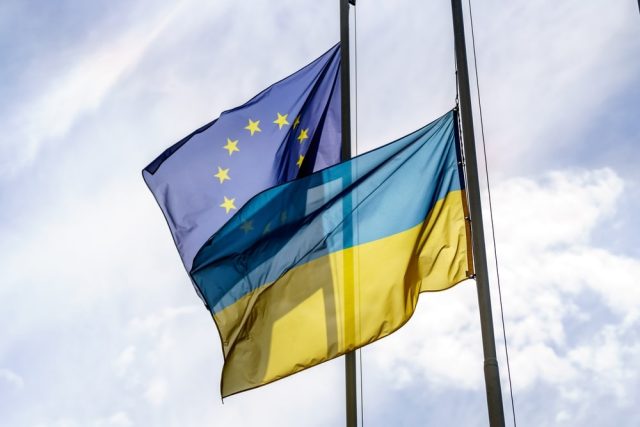
New measures slash energy ties, target “ghost fleet” ships, crypto platforms, and dozens of Russian, Chinese, and Indian firms
The European Union has unveiled its 19th package of sanctions against Russia, striking at the heart of Moscow’s energy revenues and financial escape routes. European Commission President Ursula von der Leyen announced the sweeping measures in Brussels, framing them as a direct response to Russia’s continued aggression in Ukraine and its mounting threats to European security.
“Over the past months Russia has shown utter contempt for diplomacy and international law,” von der Leyen declared, citing ongoing missile attacks on civilian targets in Ukraine, alleged GPS jamming of her own aircraft, and repeated airspace violations in Poland and Romania. “As threats to our Union increase, we respond by increasing pressure,” she added, underscoring the EU’s determination to tighten economic isolation of the Kremlin.
Accelerated Ban on Russian LNG
At the core of the new package is a faster phase-out of Russian liquefied natural gas (LNG). The Commission is proposing to advance the import ban to January 2027, a full year earlier than planned under the REPowerEU strategy.
“It is time to close the tap. We have saved energy, diversified supplies, and invested in low-carbon sources like never before,” von der Leyen said, announcing the accelerated deadline. The move signals the EU’s confidence in its ability to weather a complete break from Russian gas, thanks to expanded LNG terminals, alternative suppliers, and increased renewable capacity.
The package also lowers the price cap on Russian oil to $47.6 per barrel, cutting deeper into Moscow’s export earnings. Major Russian energy giants Rosneft and Gazprom Neft will face a total ban on transactions within the EU, while assets of refineries, oil traders, and petrochemical firms in third countries—including China—will be frozen if they are found to facilitate Russian exports.
Cracking Down on the “Ghost Fleet”
To block Russia’s attempts to skirt existing oil sanctions, Brussels is adding 118 additional vessels to its blacklist of so-called “ghost fleet” tankers—ships that transport crude through opaque ownership structures and shadowy shipping routes.
In total, the EU has now targeted over 560 ships believed to be involved in sanction-busting operations. By restricting access to European ports, insurance, and maritime services, the EU aims to choke off the logistical lifelines that have allowed Russian oil to reach global markets despite earlier embargoes.
Financial Loopholes and Crypto Under Fire
Energy is not the only front. The Commission’s second major focus is on financial loopholes that Moscow has exploited to keep its war machine funded. The package introduces new transaction bans on additional Russian banks and extends restrictions to certain institutions in third countries that facilitate Russian trade.
For the first time, cryptocurrency platforms are explicitly targeted. By imposing regulatory bans and freezing assets, Brussels hopes to disrupt digital currency flows that have helped Russian entities move money outside traditional banking channels.
Cutting Military Supply Chains
The EU is also expanding its list of export bans on critical materials destined for Russia’s defense sector. New restrictions cover advanced chemical compounds, metal components, and strategic minerals.
In a notable escalation, the package blacklists 45 new companies across Russia, China, and India accused of supplying the Russian military or helping to circumvent sanctions. “We must cut off supplies to Russia’s military industry so it cannot fuel its war machine,” said EU foreign policy chief Kaja Kallas. “Our message is clear: anyone supporting Russia’s war or seeking to evade our sanctions will face consequences.”
Using Frozen Russian Assets
Alongside the sanctions, von der Leyen announced that the Commission will soon present a proposal to use profits generated from frozen Russian assets within the EU to finance military aid for Ukraine. This step, long debated among member states, could unlock billions of euros in funding for Kyiv’s defense without requiring additional taxpayer contributions.
“I now count on member states for a swift adoption of the package,” von der Leyen urged, calling for unity among the EU’s 27 capitals to ensure that the measures take effect without delay.
A Signal of Determination
The 19th sanctions package demonstrates the EU’s readiness to escalate pressure on Russia across multiple fronts: energy, finance, technology, and military supply chains. By accelerating the LNG ban, tightening oil caps, and striking at crypto platforms and third-country intermediaries, Brussels is sending a clear message that Europe’s commitment to Ukraine remains firm.
Whether these measures will significantly weaken Moscow’s war effort remains to be seen, but the scope and depth of the latest sanctions underline a central reality: Europe is not easing its grip. Instead, as von der Leyen made clear, it is tightening it.



 Subscribe
Subscribe